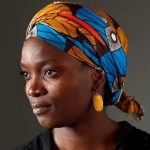EX-NAFDAC DG, LATE DORA AKUNYILI’S DAUGHTER REIGNS IN USA:
NJIDEKA AKUNYILI Crosby, Nigeria’s Born ‘Graffiti-Millionaire’ Painter WINS 2017 MacArthur Fellow AWARD…Shines as Africa’s No 1 Artist in Los Angeles
*Receives $625,000 Award Funds from the MacArthur Foundation
*Her ART Studio is Mecca-of-sort in industrial area south of downtown L.A.
*Lived in USA for 18 years, Shipped every last of her paintings for Exhibitions around the country
*Solo Show ‘Front Room: Njideka Akunyili Crosby — Counterparts’ opened at the Baltimore Museum of Art
*Staged: ‘Njideka Akunyili Crosby: Predecessors’ at the Tang Museum at Skidmore College in Saratoga Springs, New York
*Applies the mix-media of techniques and materials together with imagery from United States and Nigeria, Studied Fine Art and Biology at Swarthmore College
* Had a stint at the Pennsylvania Academy of the Fine Arts before earning an MFA in painting from Yale University
*Her permanent collections dots Los Angeles County Museum of Art, the Museum of Contemporary Art and the Hammer
* “I Plan to use parts of the funds to travel to Nigeria for an extended period to do research on arts. I want to go deeper”-NJIDEKA
 BY GEORGE ELIJAH OTUMU/FOREIGN BUREAU CHIEF/UNITED STATES OF AMERICA
BY GEORGE ELIJAH OTUMU/FOREIGN BUREAU CHIEF/UNITED STATES OF AMERICA
VERY MANY NIGERIANS are creative, hardworking and lawful wherever they live Abroad. One of such Nigerians who defied all odds for 18 years in United States as a talented painter is a Nigerian woman called NJIDEKA AKUNYILI Crosby. Her creativity, consistency, using graffiti-scribbled front door, in a neat and peaceful way has won her awards as a 2017 MacArthur Fellow.
In Los Angeles, United States, Njideka is a familiar face and a household name which opens door in many Africans, African-Americans and Latinos’ homes. The sidewalk outside Njideka Akunyili Crosby’s art studio in an industrial area south of downtown L.A. is famous for being bustling and loud.
This Nigerian painter, who has lived in United States for the last 18 years had her artistic work in national acknowledgement, as she was last month named a 2017 MacArthur Fellow. It is on record that she shipped off every last one of her paintings for exhibitions around the country. Her solo show “Front Room: Njideka Akunyili Crosby — Counterparts” opened at the Baltimore Museum of Art in October, as did “Njideka Akunyili Crosby: Predecessors” at the Tang Museum at Skidmore College in Saratoga Springs, New York. And later this month, the artist will debut new work at Prospect New Orleans, a triennial of contemporary art.
This focused Nigerian creative painter is rich. She is a Millionaire, having won
the sum of $625,000 award from the MacArthur Foundation for her ingenuity. In her words, she reportedly said: “I’m happy? I’m just so hard on myself, so critical of what I do, that it’s tough to just have that full moment of relaxing and feeling all is well. But, yeah, I’m happy.”
She is so diligent and passionate about arts that she spends seven days a week in her studio looking closely in goofy creative being central to Akunyili Crosby’s identity: hybridity defines her work. She’s a transnational artist who’s lived for roughly equal amounts of time in the United States, native Nigeria, being a career woman juggling a 10-month-old baby. Even her outfit today is a smashup: a worn, cotton T-shirt that says “Native Texan” on it — it belongs to her husband, who is white — worn with blue jeans and a silk scarf she bought in London that is tied around her head in traditional Nigerian fashion.
This happily married Nigerian amazon creative in multinational perspective runs through every one of her pieces. Her large-scale mixed-media works on paper blend figurative painting, drawing, printmaking, photography and collage. The mix of techniques and materials together with imagery from the U.S. and Nigeria — the late dictator Sani Abacha, a friend’s North Dakota wedding, a band in Nigeria that began as Michael Jackson impersonators — speak to straddling nationalities, divided personal histories and the greater appropriation of cultural traditions.
Njideka reportedly explains: “It really is about what it means to be someone who has existed between multiple worlds and carries all those influences with them at once — for me, a rural Nigerian person, an urban Nigerian person and an American at the same time. I am trying to use my work, and my life story, to explore this idea of a liminal space, or a third space, where multiple things come together to yield a new thing.”
Accordingly, she scatters color pictures of her work across a tabletop. Her intimate and seemingly quotidian scenes of domestic life in Nigeria and the United States are bold and colorful, literally layered with narratives that are personal and political, “like the layering of sediment. It’s like a faint, faded memory of a place I used to know, a place I used to live in,” she says.
Her works speak to cultural appropriation, presenting Nigerian traditions as Russian nesting dolls. Some of her unique paintings include: ‘images of tea service appear repeatedly, a local custom absorbed after British colonialism.’ She pastes West African portrait fabric into her work, a commemorative cloth worn at celebratory events such as weddings, that’s created using a Dutch wax-print technique that itself originally came from Indonesia.
A pair of works in the Baltimore show features a self portrait based on near identical photographs. In one of the paintings, she’s seated at a modest Nigerian dining table; images in the collage below include a photo of her mother from Akunyili Crosby’s wedding, Nollywood actress Genevieve Nnaji and a Nigerian lawyer wearing a traditional white wig.
Jamillah James, curator at the Institute of Contemporary Art, Los Angeles describes Njideka this way: “Njideka is an artist who has the capacity to really bring together worlds that may not stand in unison. Which is to say the continental African experience and that of black folks living in diaspora.”
In 2015, when Jamillah was at the Hammer Museum, she gave Akunyili Crosby her first solo museum exhibition, and she organized a concurrent show of Akunyili Crosby’s work at Mark Bradford’s Leimert Park gallery and social services complex, Art + Practice.
Jamillah said: “She’s able to speak universally about the experience of family and community and finding one’s way in the world. But there’s something that’s really powerful about putting forth images of black people and having those be embraced by institutions and galleries. I think that’s where the political power of her work really is.”
Growing up in Nigeria, Njideka toggled between rural and urban life. Her family lived in Enugu, a former coal mining town, and she spent weekends and summers in her grandmother’s rural village — images of which factor heavily into her paintings. As age 11, she attended boarding school in the more cosmopolitan city of Lagos.
Art wasn’t a large part of Akunyili Crosby’s upbringing. As a girl, she copied pictures from her father’s Time and Newsweek magazines for fun. But hers was a science family: Her father was a physician, and her mother, a Ph.D. in pharmacology, late Dora Akunyili, was former Director-General, National Agency for Food and Drug Administration and Control.
During her lifetime, Dora taught and went on to become a Nigerian government official, heading up the Nigerian version of the Food and Drug Administration. Of her five siblings, three are doctors, a profession Akunyili Crosby always thought she’d end up in.
After her mother won a green card lottery for the family, Akunyili Crosby moved at age 16 to Philadelphia. She took an oil painting class at the local community college, and that sent her on a new path. She studied fine art and biology at Swarthmore College, where she met her future husband, also an artist, and a stint at the Pennsylvania Academy of the Fine Arts before earning an MFA in painting from Yale University in 2011.
In the six years since, Akunyili Crosby, now 34, has swiftly ascended in the art world. She was an artist-in-residence at the Studio Museum in Harlem, which honored her with the Joyce Alexander Wein Artist Prize, and she received the Smithsonian American Art Museum’s James Dicke Contemporary Artist Prize, among other awards. In L.A. alone, her work is in the permanent collections of the Los Angeles County Museum of Art, the Museum of Contemporary Art and the Hammer.
Akunyili Crosby reached an entirely new level of recognition when she was named a MacArthur Fellow, recognized for “visualizing the complexities of globalization and transnational identity.”
Elated, Njideka said: “My brain was still playing catch up, I was in a fog,” she says. “I wasn’t screaming and laughing. I just was in a daze, sitting in my car, wondering if I was having a real experience or a dream and hallucination.”
The MacArthur award was something she’d always hoped would come, maybe in her 50s or 60s, “but it was at the end of my list of hopes and dreams,” she says, breathy, as if still stunned by the news. “I’m just excited to hibernate in my studio and experiment.”
That could take a while. Akunyili Crosby works slowly and deliberately, scouring the internet for days at a time, thumbing through family photo albums, reading novels and postcolonial theory, sketching ideas — and it all goes up on a messy process wall. She creates eight or nine large-scale works a year.
The MacArthur “genius grant” is a no-strings-attached award. Akunyili Crosby plans to use the money to travel to Nigeria for an extended period to do research. “I want to go deeper,” she says.
That goes for studio experimentation as well. Other than being included in a group exhibition at the National Portrait Gallery in London in June 2018, no new shows are in the works, giving her some free-form studio time.



